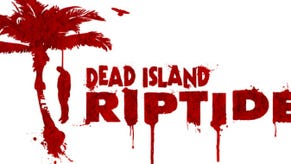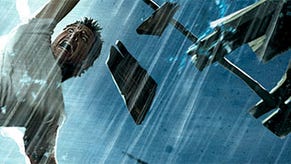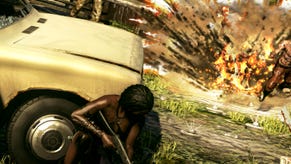Dead Island: Riptide - the importance of 4-play
Stace Harman speaks to Deep Silver to discover what lessons have been learned from its commercially successful Dead Island and how they’re being applied to the next game in the series.
The solitary hanging figure depicted in Dead Island’s title art acutely highlights the game’s confused messaging. That evocative motif, along with the now infamous trailer, suggests a depth of despair that Techland’s flimsy narrative deliberately leaves unplumbed. Moreover, when taken alongside its box art and many of its promotional images, it’s easy to subconsciously infer that Dead Island is first and foremost intended as a lone player experience. As we now know, that’s wrong on every conceivable level.
Beneath the tangled mess of misshapen contradictions, every fibre of Dead Island’s rotting being reeks of a co-op experience. Perversely, this is most evident when the game is tackled in single-player, where script and narrative inconsistencies stand just behind uglier, more aggressive mechanical shortcomings. In contrast to this, the co-op experience goes a long way to hiding a multitude of sins. Most dramatically, it transforms the island resort of Banoi from a bug-infested, half-finished construction-site of a game world into a blood-soaked, vacation experience. Played with friends, Banoi bids you welcome and then encourages you to kick back, cut loose and mutilate feckless zombies with Bruce Campbell-style maniacal glee.
Dead Island: Riptide is set to be plucked from the same macabre holiday brochure but hopes to entice you back with its upgraded facilities. This is as much a warning to those hoping for a substantial evolution of the original’s bloody DNA as it is a ringing endorsement for fans of mindless mayhem. At least this time around we all know what to expect: an emphasis on bloody carnage by way of a brilliantly imaginative set of melee weapons.
Thankfully, despite the standout success of this year’s slow-burning DayZ, Techland is forging ahead with all of Riptide’s dials cranked firmly to 11.
“When we looked at the feedback we were getting from players of the first Dead Island it came back time and time again to the enjoyment of the heavy action and hectic moments,” reveals Deep Silver creative producer, Anthony Cardahi. “This is where we see our strengths and what we've focused on going into Riptide.
“We touch on survival elements, but not to the extent of a DayZ, which I think caters to a different expectation and we would probably be diluting our strengths if we were to emulate something like DayZ. Also, with the multiplication of zombie games, it's good to have games that have their own focus, so then everyone can find something that suits their tastes.”
With a colleague in tow, Cardahi shows off a brief, 20-minute game play demo that highlights one of Riptide’s new additions. It’s one of several passages of play woven into Riptide’s campaign that mashes together Gears of War’s Horde mode and Left 4 Dead’s tense survival set-pieces. In a jungle clearing, Cardahi and co fortify the crumbling ruins of a church with rolls of fencing, makeshift mines and a mobile machinegun emplacement. Soon after, a water pump is activated that sets about noisily draining the flooded foundations of the church and thus heralds the arrival of the undead.
Wave after wave throws itself at the defences, which are repaired and replaced in between attacks. Nonetheless, they are finally breached when a couple of undead grenadiers show up to lob explosives that knock the survivors and friendly NPCs off their feet and blow apart the makeshift barricades. A tense struggle ensures and by miraculous coincidence the water pump finishes its job moments after the last of the undead are hacked in to fried, bloody chunks by way of battery-powered combat knife.
“These moments are intended to reinforce the co-op elements of the game,” explains Cardahi, who smiles at the manic events that have just unfolded on screen. “A bolstering of the physics system allows the up-close fights and blunt encounters with the zombies in Riptide to be so much more powerful.
“We think that these kinds of things are rewarding and are really what Dead Island is about and what it has always been about: the moment to moment experiences and how awesome it makes you feel.”
As with its predecessor, Dead Island Riptide’s potential for awesome looks to be the subject of basic mathematics. So long as the sum of players is greater than one, the odds of multiplying the perceived awesomeness are increased by an exponential degree. Once again, the more players there are the less likely you are to be troubled too much by awkward interactions with NPCs or occasional, unintentional tears in the game world that expose the whirring gears underneath.
I won’t go into the story details too deeply because, in all honesty, who cares? Suffice to say the original four survivors (who can be imported from a Dead Island save game with skill set intact), plus new boy John Morgan, have wound up on another island of the Banoi archipelago. This time it’s the less commercialised and waterlogged landmass of Palanai, whose blue skies are subject to a new dynamic weather system. The flooded environment ushers in another of Riptide’s new features as the survivors are forced to traverse much of the island in a small, motorised boat. The boat’s exposed, open form allows for new game play mechanics and Cardahi insists that Techland is working hard to ensure that both the boat and the water on which it floats feel like an integral part of the game’s identity.
Dead Island’s commercial success has spawned a follow-up that looks set to deliver more of the hot-headed action that made the original so popular. The pre-alpha build shows some minor aesthetic improvements over the original game, most notably in the new weather system, but it also shows much room for improvement. Currently, the clunky UI and slightly fudged collision detection remain a bugbear. There’s still much work to be done to buff the title to a higher sheen than the original, but at least this time around Techland should have the resources to do so. The developer has also gleaned valuable insight that should help it replicate the strengths of Dead Island and avoid the weaknesses of its Ryder White DLC.
It seems we may all have learned a little something since that Dead Island trailer dropped early last year: Techland’s lessons are design-based, Deep Silver’s concern the value of clear communication, while gamers and press alike have learned to temper their expectations. The overall message is clear: as with much in life, Dead Island Riptide will be more fun with friends.
Dead Island: Riptide launches on PC, PS3 and 360 on April 23 in the US and April 26 in Europe.










